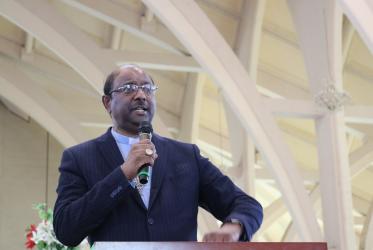The 27 June 2008 run off elections in Zimbabwe took place despite wide-spread calls to postpone them after the MDC candidate Mr. Morgan Tsvangirai withdrew from the election process. Mr. Tsvangirai cited as a primary reason for his decision the continued violence aimed at intimidating voters. The worldwide ecumenical family calls for intensified international monitoring of the situation. The World Council of Churches is prepared to participate in such a process jointly with the All Africa Conference of Churches and the Fellowship of Christian Councils in Southern Africa.
On 24 June 2008, the World Council of Churches and the World Student Christian Federation sent a letter to UN Secretary General Ban Ki-Moon stating that:
"It is now with profound concern that we call on you to increase your efforts to address the rapidly deteriorating situation in Zimbabwe. As church leaders representing more than 550 million Christians around the world, including members of many churches in Zimbabwe, we request that you direct urgent attention to the humanitarian needs of the people of Zimbabwe, their freedom to exercise religion, the destabilization of the political situation and the need to end human rights abuses."
There remain varying opinions as to how to move forward after what is now being described as a deeply flawed election. There are reports that a large number of ballots were spoiled by protests written on them by persons who felt forced to vote. Two of the most respected world leaders for justice, Archbishop Desmond Tutu and former South African president Nelson Mandela, have spoken out, as has the African Union and the UN Security Council. All are looking for justice and compassion for those who are caught up in the continued violence, food shortages and political intimidation.
How the world addresses the situation in Zimbabwe is the subject of much debate. As people of faith we always want to prevent violence. We want to react to situations of compelling human need with appropriate measures and to work toward the rebuilding of good will and reconciliation. We want this for the people of Zimbabwe.
We pray for, and we ask the international community to remember, not only the people of Zimbabwe but also those in surrounding nations who have taken in many of the displaced persons from Zimbabwe. We pray for continued strength during these times of stress.
From Archbishop Tutu we heard these strong words:
"If you were to have a unanimous voice, saying quite clearly to Mr. Mugabe... you are illegitimate and we will not recognize your administration in any shape or form - I think that would be a very, very powerful signal and would really strengthen the hand of the international community."
In the words of former South African president Nelson Mandela, President Mugabe represents a case of tragic failure of leadership. The moral authority presented by Mr. Mandela is significant in addressing these issues of justice. He has shared his sadness over the chaos prevailing in what used to be one of the most promising countries in Africa.
African foreign ministers, gathered in the Egyptian town of Sharm el-Sheikh on 30 June and 1 July for an African Union (AU) meeting, released a Resolution that calls for the establishment of a government of national unity that would bring together both parties as partners in national leadership, and the AU foreign ministers added that the SADC should establish a mechanism on the ground in order to seize the momentum for a negotiated solution.
The United Nations Security Council, through a strong 23 June 2008 Presidential statement,
" expresses its concern over the impact of the situation in Zimbabwe on the wider region. The Council welcomes the recent international efforts, including those of SADC leaders and particularly President Mbeki. The Security Council calls on the Zimbabwean authorities to cooperate fully with all efforts, including through the UN, aimed at finding a peaceful way forward, through dialogue between the parties, that allows a legitimate government to be formed that reflects the will of the Zimbabwean people.
The Security Council further expresses its concern at the grave humanitarian situation in Zimbabwe and condemns the suspension by the Government of Zimbabwe of the operations of humanitarian organizations, which has directly affected one and a half million people, including half a million children. The Council calls on the Government of Zimbabwe to immediately allow humanitarian organizations to resume their services."(S/PRST/2008/23)
The church community comes at this issue from many perspectives. We must take all the information into consideration as we proceed. For instance, because children and women are among the first to suffer if world governments choose to impose economic sanctions, the World Council of Churches remains firm in our call for humanitarian aid to meet the needs of the least of these (Matthew 25). The World Council of Churches remains resolute in its call to protect the population against increased and continued violence: Do not repay evil for evil or abuse for abuse (I Peter 3:9). The World Council of Churches looks forward to the day when Zimbabwe has an election that can truly be respected and seen as free, fair and just.
Rev. Dr Samuel Kobia
WCC general secretary
Revised 10 July 2008





